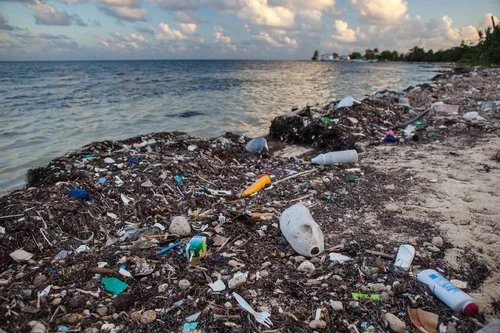BEVERAGE CONTAINER RECYCLING
From 2002 to 2010, As You Sow engaged in pioneering work asking beverage companies to set container recycling and recycled content goals. Through shareholder dialogue and the filing of proposals, we secured historic commitments from three of the largest U.S. beverage companies for bottle/can recycling goals:
Commitment: In 2007, Coca-Cola agreed to recycle the equivalent of 50% of its own PET, glass bottles, and aluminum cans in the U.S. by 2015.
Result: The company met the 50% goal on a global basis and the pace of recycling its containers in the U.S. improved, but still lags at about 42%. In January 2018, it set a new goal to recycle all packaging globally by 2030. We continue to engage with the company on increasing recycling.Commitment: In 2008, Nestlé Waters North America set an industry recycling goal of 60% for PET plastic bottles by 2018.
Result: As of mid-2018, the PET bottle recycling rate still lags far behind the goal at 31%. We await a response from the company on how to deal with the expected failure to meet the commitment.Commitment: In 2010, PepsiCo agreed to work with peers to elevate the U.S. beverage container recycling rate to 50% for PET plastic and glass bottles and aluminum cans by 2018.
Result: As of mid-2018, the beverage container recycling rate lags at 36%. We await a response from the company on how to deal with the expected failure to meet the commitment.
In addition, Coca-Cola and PepsiCo agreed in 2003 to increase the amount of recycled PET in all plastic bottles in the U.S, market to 10% by 2005. Pepsi met that goal and has sustained it continuously to the present. Coca-Cola said it briefly met the goal but then fell back a year later and has been unable to sustain 10% recycled content in its bottles in the U.S. A Coke goal to use 25% rPET was abandoned in 2011 by being folded into a new goal to use 25% recycled or renewable material by 2015. The company continue to decline to state how much rPET is used in the U.S.
As You Sow is monitoring and building on these commitments, while also moving to engage more broadly with consumer packaged goods companies in the food and beverage industry though our Consumer Packaging initiative.
As You Sow has published unique surveys and reports cards ranking beverage companies' packaging sustainability performance. Nestlé Waters' director of corporate citizenship credited our original 2006 scorecard and subsequent dialogue as "getting our attention and encouraging us to look at the recycling challenge more broadly." After engagement with As You Sow, Nestlé Waters became the first major beverage producer to support Extended Producer Responsibility legislation to increase container recovery rates and in 2008 to set an industry-wide recovery goal for PET plastic.
BACKGROUND
Of 243 billion beverage packages sold in the U.S. annually-glass bottles, plastic bottles and aluminum cans as well as foil pouches, gable top cartons and other nontraditional containers-153 billion are either landfilled, littered or incinerated. A whopping 63% are wasted according to the Container Recycling Institute.
Most people don't realize that beverage container recycling has a direct impact on climate change and energy security. If all of the beverage containers that are wasted had been recycled, 15.6 million metric tons of greenhouse gases would have been avoided, the equivalent to emissions from 36.2 million barrels of oil.
Using recycled materials is one way that beverage companies can reduce emissions and energy use. Making containers from recycled content uses significantly less energy and fossil fuels in their production than using virgin materials: recycled aluminum uses 95% less energy, recycled plastic uses 30% less energy, and recycled glass uses 35% less energy.







